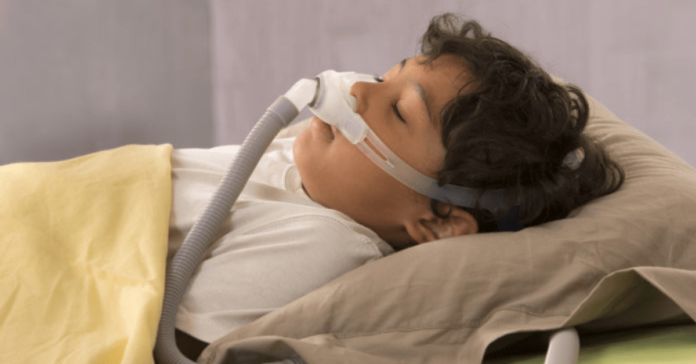Overview
Obstruction of the upper airway because of some reason can cause pediatric obstructive sleep apnea that results in the stoppage of breathing when the child is asleep. It results in a fall in oxygen levels, causing sleep interruption. This can severely affect the growth, behaviour, and learning capability of the child.
About pediatric obstructive sleep apnea
Pediatric obstructive sleep apnea is a sleep disorder in children because of partial or complete blockage of breathing during sleep.
Symptoms and causes of sleep apnea are different for adults and children . While adults generally have daytime sleepiness, children are prone to have behavioral issues. In children the common underlying condition is enlargement of tonsils and the adenoids, while the underlying cause in adults is often obesity.
Pediatric obstructive sleep apnea can also lead to heart problems. Nonetheless, it is a treatable disorder, and early treatment can prevent serious complications such as abnormal behavior growth and cognitive development.
What are the symptoms of pediatric obstructive sleep apnea?
Pediatric obstructive sleep apnea causes an obstruction in breathing while the child is asleep. As this leads to a fall in oxygen levels, the child often wakes up at night and has disturbed sleep. This disturbance is momentary, and the child may not remember this happening. Following are symptoms of pediatric obstructive sleep apnea:
- Restless sleep
- Choking during sleep or mouth breathing
- Bed-wetting or sweating
- Unusual sleeping positions
- Intermittent snoring with gasps and snorts
- Heavy breathing during sleep
- Nightmares
- Sleepwalking
- Behavioral issues
Children with sleep apnea experience difficulty waking up and are either hyperactive or tired during the daytime. They usually also find it difficult to perform well at school.
When to see a doctor for pediatric obstructive sleep apnea?
Consult a pediatrician if you notice the following in your child:
- Usually feels tired
- Is not fresh or active after waking up
- Cannot pay attention
- Exhibits behavioral issues
- Learning problems
- No or poor weight gain
Timely diagnosis and treatment are important to prevent complications of pediatric obstructive sleep apnea. Visit a child specialist if you notice these symptoms.
Call 1860-500-1066 to book an appointment
What are the complications and risk factors linke to pediatric obstructive sleep apnea?
Failure to treat sleep apnea in children may cause the following serious complications:
- Lack of normal growth
- Cardiac problems
- Death
Being obese or overweight is the most common risk factor that may lead to pediatric sleep apnea. Following are also significant factors to consider:
- Cerebral palsy
- Facial abnormalities
- Abnormalities of skull
- Family history of obstructive sleep apnea
- Sickle cell disease
- Neuromuscular disorders
- Low birth weight
- Down syndrome
What are the available treatment options for pediatric obstructive sleep apnea?
The doctor will consider all aspects of the child’s health along with the clinical examination and test reports before recommending any of the following treatment options:
- Weight management: Diet modification and exercises may be helpful in reducing body weight if the condition is a result of obesity.
- Medicines: The use of topical nasal steroids may help treat mild cases of sleep apnea in children. Anti-allergy drugs may be necessary to relieve allergies.
- Removal of tonsils: Tonsillectomy or adenotonsillectomy may be necessary if sleep apnea is because of enlarged tonsils and adenoids .
- Continuous Positive Airway Pressure (CPAP): The CPAP therapy involves wearing a mask that keeps on pumping air to ensure that the airways are open.
- Oral devices: Expansion of nasal passage and the palate may be necessary with oral appliances.
Conclusion
Pediatric sleep apnea is a sleep disorder in children that can lead to severe complications. The condition can affect the child’s overall growth and can also impact behavior and physical and academic performance. Sleep apnea is a treatable disorder and early treatment can prevent complications. Pediatric sleep apnea manifests in multiple ways. Consult a child specialist if you notice symptoms of sleep apnea in the child.
Call 1860-500-1066 to book an appointment
Frequently Asked Questions (FAQs)
Are there any tests for pediatric sleep apnea?
The pediatrician may suggest studying your child’s sleep patterns to detect sleep apnea or other sleep disorders. These studies are free from any risks and cause no pain or discomfort to the patients. Your child may also have to stay overnight in the hospital for a better diagnosis. These studies check multiple health parameters like heart rate, brain waves, breathing patterns, and sleep positions.
Can a child recover from sleep apnea after reaching puberty?
It depends on the cause and severity of sleep apnea. Many children with mild symptoms of sleep apnea may recover as they grow up. However, it is necessary to treat the condition if the sleep apnea is severe and affects growth and development.
Is pediatric obstructive sleep apnea possible in a child younger than one year of age?
Pediatric sleep apnea is most common from two to six years of age. However, it can affect the child at any age. Sleep disturbances can severely affect the normal development of the child during critical growth stages.


















